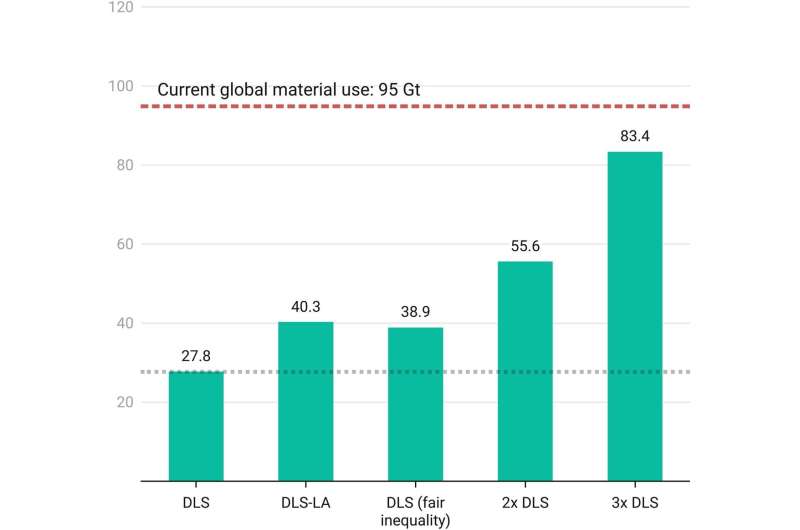This article has been reviewed according to Science X's editorial process and policies. Editors have highlighted the following attributes while ensuring the content's credibility:
fact-checked
trusted source
proofread
How much growth is required to achieve good lives for all while reducing environmental damage?

Ending mass human deprivation and providing good lives for the whole world's population can be accomplished while at the same time achieving ecological objectives. This is demonstrated by a new study by the Institute of Environmental Science and Technology of the Universitat Autònoma de Barcelona (ICTA-UAB) and the London School of Economics and Political Science, recently published in World Development Perspectives.
About 80% of humanity cannot access necessary goods and services and lives below the threshold for "decent living." Some narratives claim that addressing this problem will require massive economic growth on a global scale, multiplying existing output many times over, which would exacerbate climate change and ecological breakdown.
The authors of the new study dispute this claim and argue that human development does not require such a dangerous approach. Reviewing recent empirical research, they find that ending mass deprivation and provisioning decent living standards for 8.5 billion people would require only 30% of current global resource and energy use, leaving a substantial surplus for additional consumption, public luxury, scientific advancement, and other social investments.
This would ensure that everyone in the world has access to nutritious food, modern housing, high-quality health care, education, electricity, induction stoves, sanitation systems, clothing, washing machines, refrigerators, heating/cooling systems, computers, mobile phones, internet, and transport, and could also include universal access to recreational facilities, theaters, and other public goods.
The authors argue that, to achieve such a future, strategies for development should not pursue capitalist growth and increased aggregate production as such but should rather increase the specific forms of production that are necessary to improve capabilities and meet human needs at a high standard, while ensuring universal access to key goods and services through public provisioning and decommodification.
In the Global South, this requires using industrial policy to increase economic sovereignty, develop industrial capacity, and organize production around human well-being.
At the same time, in high-income countries, less-necessary production (of things like mansions, SUVs, private jets and fast fashion) must be scaled down to enable faster decarbonization and to help bring resource use back within planetary boundaries, as degrowth scholarship holds.
The authors demonstrate that the standard development strategy, which is to increase aggregate economic growth, is inefficient at achieving human development. In the existing economy, capital invests in what is most profitable, rather than what is most necessary for human development. As a result, poverty may persist—or even increase—despite economic growth.
Furthermore, in many cases, the prices of essential goods like food and housing increase at a faster rate than prices across the rest of the economy, particularly during periods of privatization and market deregulation. This means that people may suffer reduced access to essential goods even as their PPP incomes increase. This problem can be addressed through strategies of decommodification, public provisioning and price controls.
"If human well-being is the objective, it is not GDP (aggregate production in market prices) that matters, but whether people have access to the specific goods and services they need to live good lives. We need to distinguish between what is important for human well-being and what is not," says Jason Hickel, researcher from ICTA-UAB and the UAB Department of Anthropology.
"Poverty is not an intractable problem that requires long timeframes and large increases in production that conflict with ecological objectives. The solution is straightforward. We can do it right now, by shifting production away from capital accumulation and elite consumption in order to focus instead on providing socially beneficial goods and services for all," Hickel said.
More information: Jason Hickel et al, How much growth is required to achieve good lives for all? Insights from needs-based analysis, World Development Perspectives (2024). DOI: 10.1016/j.wdp.2024.100612
Provided by Autonomous University of Barcelona





















